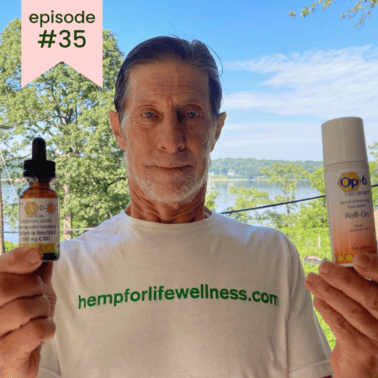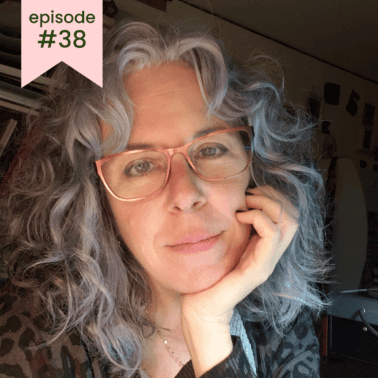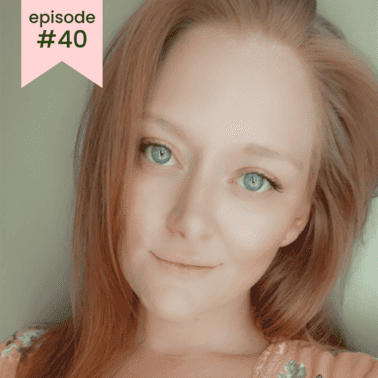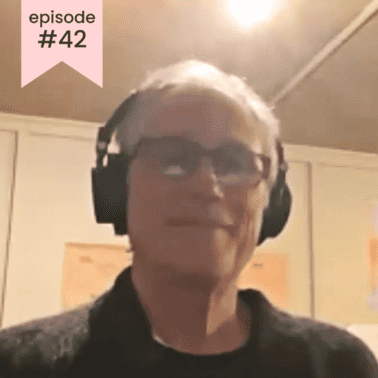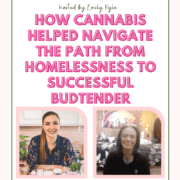This conversation is a testament to resilience and perseverance and a powerful endorsement of the healing powers of cannabis. Join us today as our guest, Kalye Obendorf recounts her triumphant journey from overcoming homelessness to becoming a successful budtender and the remarkable role cannabis has played.
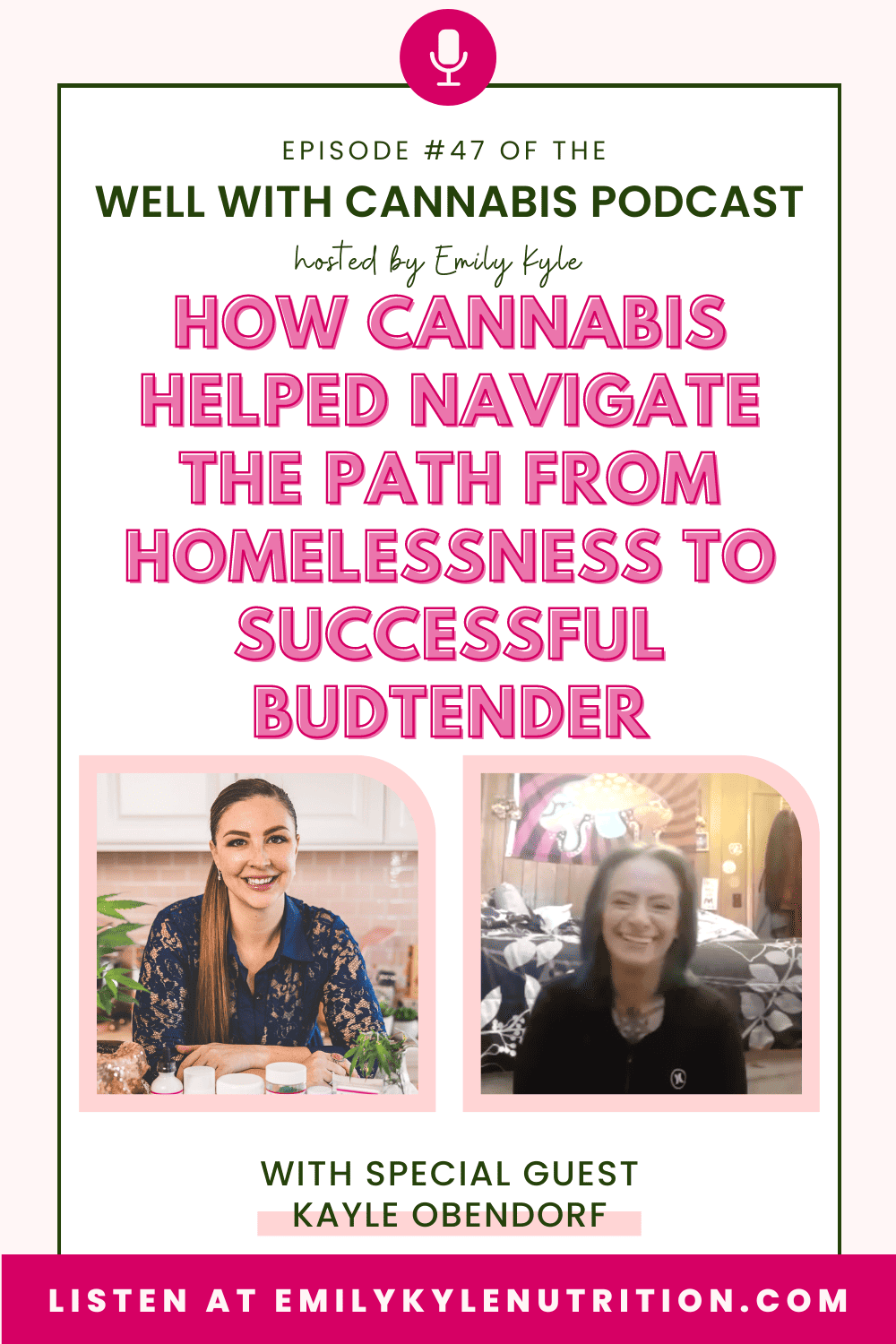
Table of Contents
Features
- Release Date: Wednesday, September 6, 2023
- Episode Number: Season 1, Episode 47
- Special Guest: Kalye Obendorf
Listen To The Episode
Click the play button above to listen to the episode.
Listen to all podcast episodes →
Why You Will Love This Episode
Welcome a new episode featuring Kalye Obendorf, a passionate advocate for cannabis who has navigated a challenging path from homelessness to becoming a successful budtender.
Kalye grew up surrounded by cannabis, recognizing it as medicine from the beginning.
She recounts how her grandmother used every part of the plant and how her homemade salve even saved a cat’s life after the vet said there was no hope.
Kalye also discusses her own battle with depression, anxiety, and pain and how cannabis has been a constant ally.
In this episode, Kalye shares her experiences and explains how a budtender can help you find the best strains and preparations. She gives advice on why the budtenders are there and what you can learn from them in a simple, five-minute conversation.
Join us on this enlightening journey with Kalye Obendorf and be inspired by her resilience and unwavering belief in the power of cannabis. Your journey towards understanding the world of cannabis starts here.
Full Transcript
Kalye: I’ve literally survived everything. Domestic violence, car accidents. I’ve survived PTSD. I’ve survived learning how to walk, moving from state to state, being homeless, and many different things. I’ve survived it.
Announcer: Welcome to the Well With Cannabis Podcast, a show dedicated to telling the life-changing stories of those who live well with cannabis all while teaching you how to do the same. Meet your host, Emily Kyle, a registered dietitian nutritionist turned certified holistic cannabis practitioner. Emily changed her life for the better with the help of the cannabis plant, and now she’s committed to helping others do the same.
Tune in each week to hear heartwarming stories and gain the knowledge you need to feel connected, inspired, and supported on your own cannabis journey. Whether you’re a new cannabis consumer or a lifetime lover, you’ll benefit from these uplifting tales of real-life journeys that will show you how you, too, can live your best life well with cannabis.
Disclaimer: Hi there. Before we jump into today’s episode, I wanted to share a note on potentially sensitive content. The episodes on the Well With Cannabis Podcast are created for adult audiences only. We will, at times, cover sensitive topics, including but not limited to suicide, abuse, mental illness, sex, drugs, alcohol, psychedelics, and the obvious use of plant medicine. Explicit language may be used occasionally. Please refrain from watching or listening to the show if you’re likely to be offended or adversely impacted by any of these topics.
The information on this show is for informational and educational purposes only. It does not constitute medical advice. If any of the content on this podcast has brought up anything for you, please reach out or speak to a professional or someone you trust.
Emily: Hello, and welcome back to another episode of the Well With Cannabis Podcast. I’m super excited to be here with our next guest today, Ms. Kalye Obendorf. Kalye, welcome. Thank you so much for joining us today.
Kalye: You are so welcome. Thank you for having me.
Emily: You have so many different ways that cannabis has impacted your life, and I’m really excited to hear about all these different ways. I’m going to give you the floor. Tell us a little bit about you and what cannabis means to you in your life.
Kalye: I’m from Idaho, born and raised. I lived there until I was about 27, and then I moved to Oregon. I was raised on the wrong side of the tracks, I guess you could say. My family had it really hard. My dad and my mom were both addicts. They always used cannabis as a fallback when they would get clean. And so it was always their gateway out.
Kalye: I was always raised with it as a fixture in our life. My mom cooked with it; my grandma made salves with it. She always used it for medicinal purposes. It was never actually like a party thing. You know how everybody looked at it. And so, as I was growing up, the laws stayed the same; it’s illegal in Idaho. And they never swayed. I never understood why it was illegal, so as I was growing up and kept going through these things, I just kept learning more and more about it as it was still a staple in my life.
Kalye: My parents are both on parole because of weed. My whole family got in trouble for it. I wondered why we weren’t moving, but it was actually just really hard for them to pick up and go.
Kalye: I’ve been in car accidents and am a recovering pain pill addict. Doctors just wanted to give you drugs; they didn’t really want to help. I was in a car accident when I was 19, right out of college. I finished college the day before, and my first husband and I were driving to pay a bill. We got into a wreck. I broke 27 bones, and my son passed away. I had broken my pelvis, so I was in a wheelchair for four years.
Kalye: I was too young for the doctors to want to perform surgery, so for the next four years, all I could do was try to fight the pain because I couldn’t control it. Cannabis allowed me to get clean from the pain pills; now, it’s all I use. I’ve had 21 surgeries; 17 of them were to repair the damage to my body, and my fallback is always weed. I use it for everything. It gives me my quality of life back. I don’t have to resort to taking a pill every four hours. It’s the only thing that has ever been a constant positive in my life.
Emily: That is a crazy story. I’m so sorry to hear about all of that happening to you. I really want to talk, though, about the pain pills. So many people are prescribed these pills by their doctor, and they think those are their only options. Many people say it doesn’t necessarily help the pain 100%, but it keeps them in that cycle of needing more. And so, for anyone in that situation who is considering shifting to cannabis, what advice do you have for them? How did you do it?
Kalye: Slowly. They were giving me 120 oxycodone per month, and I was taking six a day. I slowly weaned myself off half a pill at a time and would use a topical. I got the strongest topicals I could find because I had broken my hip and needed that whole area to be manageable. At some point, the pain was so bad that you couldn’t touch me without me cringing and crying in pain.
Kalye: My body was so used to the pain pills that when they would wear off, it felt like I was on fire. It was awful. I slowly weaned myself off half a pill at a time and used cannabis instead. I would smoke a joint or roll on a topical.
Kalye: I learned how to walk again after I moved to Oregon. I was able to use cannabis recreationally how I needed to without legal implications. My doctor was already fine with it because I was on the tail end of my pain pill contract. After you’re on pain pills for a certain amount of time, they put you on a contract.
Emily: Wow, that’s crazy. So the doctors were happy and helpful in your transition to cannabis. Is that correct?
Kalye: Yes. They were happy that I was coming off of the pain pills because I had been on them for almost 10 years straight. That was just because I couldn’t manage the pain. It was just too much. There was too much of my body broken. They were concerned about my pain pill usage because my kidney, liver, and pancreas were all starting to shut down. He didn’t drug test me because he knew that if I came back with a positive drug test, they would cut me off completely, and I would be blacklisted in every hospital on a database.
Emily: You are not the first person to tell me that, and I’m always mind-blown that they are not only anti-cannabis but also very unhelpful to the patients that they claim to care about. You start to wonder if they really care about the patients or if it’s all just paperwork and transactions to them. That’s what it seems like when they cut people off for using THC, especially when trying to wean off other things the appropriate way. It’s as if they’re saying that they’d rather patients have to go through it all cold turkey, and they don’t want them to know about it. It’s crazy to me.
Kalye: The reason why they do it is because they work for big pharma. And if they don’t keep us coming back, then they don’t have a consistent income. And then they’re out of a job, and we’re healthy. Why would they want us to be healthy? They can’t go to the doctor.
Emily: It is so true and so sad and so crazy. What has your transition been like from Idaho to Oregon? You went from one of the strictest to one of the most liberal states. What was that like?
Kalye: It was crazy. It was crazy socially. It was crazy medicinally. I had to find a doctor who was okay with cannabis use because not all of the doctors were, even though Oregon is a legal state. They had to do a complete evaluation to re-diagnose my CPTSD and depression from all of the trauma in my life. Sometimes, they won’t prescribe people mental health medications if they use cannabis because they believe they counteract. I always wondered how they could counteract since we have an endocannabinoid system.
Emily: It is so mean.
Kalye: It is. And then I started bud-tending over here. I got my license. I serve every day, and I learned all these laws. I advocate strongly with the doctor’s offices and freak out on them.
Emily: So I think you’re the first budtender that I’ve actually met in real life. I’m so excited. Do you mind talking a little bit about that? Because I’m super interested.
Kalye: I totally can. What would you like to know?
Emily: What does a day in your work life look like?
Kalye: So I don’t know if I can say the name of the company that I work for. So, I’m just going to say I work in Ontario at one of the bigger dispensaries. We are the top sales in all of the stores that my company, a conglomerate of dispensaries, owns. We’re right off the freeway, so sometimes the line is out the door and around the corner. Seriously. It’s like that all day long. Some days I sell sixty pounds. There is a two-ounce per day legal limit, but I also sell grams of wax and other products. It’s amazing because we have a curbside service. What’s better than pulling up to get your weed brought out?
Emily: That’s the best, especially for folks who are sick. It’s a very good service for our elderly and our sick folks. They don’t have to get sick. You can bring it right to them. How fun. Do you enjoy it?
Kalye: I love it very much. Some days are emotionally hard because I’m like a counselor. My customers will divulge everything right at my counter, and by the end of it, I’m crying, she’s crying, we’re all crying. Some days, I’m like their therapist.
Emily: For so many people, when they go to a dispensary, it’s their first introduction to any form of cannabis. You’re the first person they get to talk to, so they word vomit because they don’t know what to say or do. Your role is so important for these customers’ journeys. I’ll bet you do feel like a therapist a lot of the time.
Kalye: I yeah, I do. And I feel like, as a budtender, I have a knowledge that most people don’t have right at my fingertips. I have a computer right there that I can log on to so that I can look up anything I need to. I always tell my customers the truth about what they’re getting. I never try to swindle them out of money. I’m a salesman, yes, and I will upsell you. But you will get a better product and won’t walk away unknowingly. You will know something new about cannabis by the time you leave my counter. I can’t say that for any other budtenders, but I’m definitely going to tell you something.
Emily: Say somebody needs to go to the dispensary, but they are scared. What advice do you give to the people walking into that door for the first time?
Kalye: Do your homework on where you want to go and what you want to see. Not every dispensary is the same, and you might want to go to the smaller ones that aren’t as popular first. The bigger dispensaries can be overwhelming because there are people elbow to elbow in there, and they’re trying to get them through but also trying to be professional about it and not just make a sale. Smaller dispensaries have more time to give you one-on-one; you’ll need that as a first-timer. I don’t think that a dispensary should be like a candy shop unless you’re using it recreationally. If you’re wanting to use it medicinally, you should be willing to listen for just five minutes because there’s more to the product you’re getting.
Emily: Oh, my gosh, that’s great advice. Thank you so much for sharing that. You are our first budtender, so I feel like everybody can learn so much from you. It’s awesome. Thank you.
Kalye: I could talk for hours. I love it.
Emily: As I said, you’re the first budtender, and many people are so scared to go to the dispensary. Many of the people that I work with and who listen to this show are of the older generation. It’s easy for younger generations to go to the dispensary because we know what concentrates are and what flower is. For people who have only ever experienced a bag of weed in the 1970s, the dispensary can be overwhelming due to the number of different kinds of products they’ve never heard of before.
Emily: They don’t know how to use them; they don’t know what to use them for. And, as you said, if they’re coming in with a medical mindset versus a recreational mindset, they probably are looking for something a little bit more specific, but they don’t know what they’re looking for. And that’s why I’ve always said budtenders are there to help you.
Emily: And it’s so nice to hear you say, “This is what I do. I’m here to help you.” A lot of people are nervous, and they’re afraid they’re going to look stupid when they walk up to the counter. But I think just hearing from you that it’s a completely normal experience, hopefully brings a little comfort to people as they go forward.
Kalye: For sure. And remember, I’m a civil servant. You’re a paying customer. You’re the reason why my kids have food on their table. So don’t be afraid to ask questions. It’s our job to know.
Emily: That is so sweet and such good advice. Now, you’re working in the dispensary. How does life look with cannabis now? Are you using it medicinally or recreationally? How is that fitting in?
Kalye: I literally use it for everything. I use bath bombs. I use hemp in my shampoo and conditioner, in my hair dye, and in my lotion. I smoke recreationally. It’s pretty much a staple in my hand. I have it next to my bedside table. It’s like a coffee station, but I have a weed station. I get a discount through my work, so I spend a little bit of money at the dispensary. I get tips every day, so that helps a lot.
Emily: That’s perfect. And you had mentioned earlier, you said improved quality of life. Talk a little bit about what that looks like for you and for anyone who’s not sure how cannabis can help beyond just the obvious.
Kalye: So my pain pill addiction led into an alcohol addiction, and then it led into harder drugs throughout my life. It took me until I was 26, 27 to really nosedive. My dad died and I just, I lost it. I was dependent on a drug or a drink or something and cannabis ended up replacing all of that. I used tincture to help with the withdrawals from alcoholism, and I quit drinking four years ago.
Emily: Congratulations.
Kalye: Thank you. The other hard drugs were because of the pain. Again, I was in a lot of pain, of course. I just replaced all of the prescriptions with cannabis in some fashion. I used lotions because you can put lotion on a million times a day, you don’t ever feel a head high and you get all the medicinal benefits. So it was comforting to know I had that medical backing and I wasn’t doing it alone.
Emily: Absolutely. Did you feel like you had a lot of support as you transitioned? Did your family, spouse, or anybody else support you, or did you find that you did it alone? What did that look like?
Kalye: I did. I did have a backing, but I also didn’t have a backing because nobody followed the way I did it. They went off on their own, and I still ended up doing it alone. They agreed, but they weren’t with me on it.
Emily: Any advice for someone out there who feels super alone, who feels like they’re too scared to move forward in looking at cannabis as a solution?
Kalye: Don’t be afraid to try new things. Even if you’re afraid of THC, all you need is just a hair of THC in your lotion for it to do just more than enough. CBD is actually better in medicinal fashion; you only need a little bit. So don’t be scared. The numbers don’t equal the amount.
Emily: Definitely. Oh my gosh, that’s great advice because so many people, if they can push through that first fear and have the chance to experience it then they know if it’s right for them, and if it’s not, no problem. If it is right for you, you can unlock this whole kind of beautiful new world with cannabis.
Kalye: And then it leaves you open to many things because now you’re not dependent on, for instance, taking a pill in four hours and then knowing that you can’t drive in that timeframe because you’re going to be dizzy all the time. You can just put a topical on your skin.
Emily: Oh, that’s perfect. And I love that you keep mentioning topicals because so many people fear that head high. They’re afraid to use cannabis because they don’t want to get high. But especially for our older generation, putting it on the skin is not going to make you high, but it will give you relief. It can be super, super beneficial, especially for pain. I’m so glad that you keep mentioning that for anyone who wants to try cannabis but is afraid. It’s probably the best first step for you because it’s a safe way to experiment.
Kalye: That is correct. That is the safest and easiest way to do it. Everybody thinks about edibles. No.
Emily: Not for your first time. Take some time on that. But if you can find the topicals, it’s such a relief that you can use it as frequently as you want throughout the day without worrying about being impaired or feeling unwell. It’s just that perfect solution.
Kalye: Correct. And then even if the topicals don’t work for you, and you have to ingest, there’s RSO, tinctures, dabs, everything. My mom has three autoimmune diseases and has completely transitioned from pharmaceuticals to multivitamins and cannabis.
Kalye: My ex-husband had cancer, and he was all holistic, no pharmaceuticals whatsoever, and RSO saved his life. It put him into remission.
Emily: That’s crazy.
Kalye: Yeah. Okay, so this is going to be weird, but my grandmother saved a cat’s life. The cat had been attacked by a squirrel, and she used horse liniment and cannabis in a salve, put it in the cat’s wound, and it healed. The vets wouldn’t operate on it because they thought the cat had no chance of living, and it lived. My grandma saved his life with just a trim! Just put it in a poultice and slap it on that cat’s head.
Emily: Oh my gosh, that’s amazing.
Kalye: Don’t bite a cat to put salve on it, but…
Emily: But if it works, so many people are also looking for relief for their animals. Cats and dogs can definitely benefit from cannabis. Now, I should say dogs and cats shouldn’t ingest much THC orally. She saved that cat! That’s crazy!
Kalye: Yeah. It’s literally a miracle drug. You can do everything with it. There are endless possibilities. You can run your car off of it.
Emily: I bet you see a ton of success stories working in the dispensary as well. Do you? Do people come back and say, “What you recommended helped me?”
Kalye: Yeah, I do. Actually, I do see a lot. I have a, I guess, a fan base. Like yesterday, a customer walked in and greeted me by name, and I’m like, I didn’t remember him. I see 150 people a day.
Emily: Oh, but that they remembered you and the experience you gave them and then your recommendations changed their life and improved their quality of life has to be such a good feeling at the end of the day.
Kalye: It is a good feeling. My whole life, I’ve always wanted to work in this industry. I loved it when the 90-year-old who came into my bud station left with more knowledge than he had coming in, and he was willing to admit that it works instead of fighting against it. I have to help change the older generation’s mindset on cannabis because they’re the reason it’s illegal in the first place. That was a great feeling. If I never accomplished anything else, that was the reason I chose to do this job.
Emily: That is beautiful. I love that. And I feel for so many of us who have been positively impacted through cannabis; we feel like we have to turn around and help others and then feel like that help actually came to fruition and improved the quality of someone else’s life. That’s just the best feeling. I’m so happy for you.
Kalye: Thank you. And it was amazing because he was actually 87 years old and he was like, he was very adamantly not sure about this. He thought that it wasn’t okay and wasn’t regulated because it’s not a pharmacy. I always reply with the line, “Doctors go to school for 12 years to say they practice medicine. I got the privilege of spending $100 for the ability to actually give medicine and actually do something for the next five years.”
Emily: That’s gotta be so amazing. 87 years old, and it changed his mind in a way for the better. And then, hopefully, he goes out and tells his friends, and they tell their friends, and it just snowballs into what will hopefully be a multi-generational change over time.
Kalye: We actually have. I work the night shift, and we actually have a completely different crowd from morning to night the elderly come in at the nighttime, and then the partiers come in, like the more recreational, they go in the daytime like the music is even different there too during the day and the night.
Emily: Interesting. You have to see such a wide variety of customers coming in and out the door.
Kalye: Yes, I do. I see every gambit.
Emily: Everybody uses cannabis. They just don’t say it out loud.
Kalye: Correct. And like everyone, everybody, literally everybody, and we’re right off the freeway so everybody stops there. Sometimes the parking is non-existent.
Emily: And you’re in Oregon. It’s crazy that it’s been legal for that long and you still have lines wrapped around. We don’t have dispensaries. They’re getting set up here in New York state, and they say there are lines. That’s understandable for the first couple of days, but Oregon is years in and still has lines around the door. That’s crazy.
Kalye: We have 12 stores in Ontario by itself. And every single one of them, depending on the day, could be elbow to elbow. I know that my dispensary has two stores in Ontario, and they are the top sales out of all of our stores.
Kalye: There’s 44 stores that my company owns all over Oregon and three other states and they’re buying in three more. They’re the same two owners like they’re not like a corporation. And they are all localized and they originated in Portland and every day we do probably 100,000 sales.
Emily: That’s amazing and so exciting to hear that they’re expanding. There are so many states, like Texas and Arkansas, where it is still so illegal, and it is so hard for people to get products. They can’t walk into a dispensary. To hear that we’re actually making progress and you’re expanding across the country is exciting. I just can’t wait until we see some federal legalization. Everybody can have the opportunity to line up at a dispensary and meet you.
Kalye: That’s correct. And we’re getting closer. They actually just passed a law for seeds. So if they’re not in the dirt, seeds are able to ship to all 50 states. That’s legal on the Farmers Act, like USDA.
Emily: Yeah, I saw that just recently got passed. I’m so excited!
Kalye: Yeah. It’s amazing. I saw this website, and I wondered why they were selling seeds, so I researched and discovered that it was legal. I thought it was amazing.
Kalye: That broadens the horizon so much. A lot of the plants are in cryostasis. They can now be moved from state to state, and it’s not federally illegal.
Emily: It’s such a relief, and I’m such a huge proponent of people growing their own at home anyway. I want people who go outside and grow a tomato or a zucchini in the summer to be able to throw in a cannabis plant.
Kalye: Yes, absolutely.
Emily: I want people to feel like that’s a normal thing that we do in our culture. And so hearing that did pass and that’s more accessible, and people will be less scared to buy them for legal repercussions. It is exciting. It is the future, hopefully.
Kalye: I hope I still live to see it. And I hope that you live to see it too. I know it’s been over a hundred years old fight.
Emily: It’s crazy, but then I think we have seen so much progress in the last 10 years that it makes me feel optimistic because I’m usually pessimistic about it, but I have to look on the bright side. And we have made a lot of progress, which is amazing.
Kalye: We have definitely made a lot of progress when you look at the whole picture, but honestly, it’s just like a snail’s pace. And that’s just because the government knows that they messed up. It’s a cash crop. We’re gonna take over, and they’re gonna lose, and everybody’s gonna be happy. We’re all gonna be hippies. That’s all. We’re all gonna be hippies. We’re all gonna be smoking weed.
Emily: Everyone’s gonna be happy. Everyone’s gonna be feeling good. Everyone’s gonna be off their meds. It’s just an exciting time; I really hope that more people get the chance to experience the healing benefits of the plant, just as you and I have, and hopefully, I just want people to have a better quality of life at the end of the day.
Kalye: I do too, and I came from working in an industry where it was completely forbidden and into an industry where it’s the number one thing. I have actually served my old bosses from Idaho in my budtender station. I was like, “I knew it!”
Emily: So full circle, though. Oh my gosh, this is crazy.
Kalye: Yeah. I was like, “You. I know you. I know you.” He said, “Yeah. You don’t see me.”
Emily: It’s so nice, though, to see how things can change for the better in just a few years. Now you’re doing something that you love and said you’ve always wanted to be doing and serving old bosses. It’s perfect.
Kalye: Yeah. Karma comes full circle. Absolutely.
Emily: Oh, I believe it. This has been a wonderful conversation. I’m so glad I met my first real budtender and want to respect your time. Can I ask you the same four questions I ask all of our guests?
Kalye: Yes.
Emily: Awesome. Okay. First up, what are you most proud of in your life to date?
Kalye: I’ve survived everything. I’ve literally survived everything. Domestic violence, car accidents. I’ve survived PTSD. I’ve survived learning how to walk, moving from state to state, being homeless, and many different things. I’ve survived it.
Emily: And you’re here to share it with us. Thank you so much for sharing that with us. I really appreciate it.
Kalye: You’re welcome.
Emily: On the opposite side, what would your life look like without cannabis?
Kalye: I would completely depend on everything the doctors told me to do. I would be completely wrapped around drugs and alcohol. I would not have had a light at the end of the tunnel.
Emily: I’m so glad you found cannabis and the light at the end of your tunnel. If you could go back 10, 20, 30 years ago and give yourself just one piece of advice, cannabis-related or not, what would it be?
Kalye: Oh, probably move sooner.
Emily: From Idaho to Oregon is a world of difference. I can’t even imagine.
Kalye: 100%.
Emily: Does Idaho even have medicinal cannabis at all?
Kalye: They don’t have medical cannabis at all.
Emily: It’s one of the strictest states, right?
Kalye: Yeah. Yeah. You’re lucky if you don’t get a life sentence.
Emily: It’s insane. And then to go to Oregon, where it’s like the land of the free, enjoy all you can with cannabis.
Kalye: They always say, “Come smoke your weed in Oregon, go party in Idaho.”
Emily: Interesting. All right. I’ll go to Oregon. I like weed. Very last question. If you could be remembered for just one thing in the cannabis space, what would it be?
Kalye: That I always learn. I never stopped learning and following along and making sure that everybody else knew the information, too.
Emily: I can’t thank you enough for coming and sharing your experience, your information, your wisdom with us here today. It’s been an absolute pleasure. Thank you so much.
Kalye: Thank you for having me. I appreciate it.
Announcer: Congratulations, you’ve finished another episode of the Well With Cannabis Podcast and are one step closer to discovering how you, too, can live well with cannabis.
Thank you for listening in today. We hope this episode has been a helpful and informative one. Please visit emilykylenutrition.com for more information on today’s show, show notes, guest information, recipes, and other resources.
If you want more support and encouragement on your cannabis journey, please consider joining the private Well With Cannabis Community. In this group, you can connect with like-minded individuals focused on improving their health and wellness through cannabis.
Join the group today to continue your journey of wellness together!
Related Episodes
Podcast Episodes
Green Insights: Sharing A Lifetime of Cannabis Wisdom
Podcast Episodes
Exploring Cannabis as a Tool for Motherhood and Fibromyalgia
Podcast Episodes
Mental Health Therapist Helping Others Through Cannabis Coaching
Podcast Episodes

